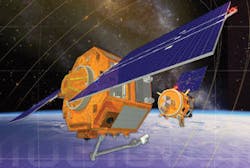Engineers at Boeing Integrated Defense Systems-Advanced Systems in St. Louis required a solution with which to test and optimize Voice over Internet Protocol (VoIP) and telemetry data for satellite networks, in support the Orbital Express demonstration mission. For these tasks, they selected the Compass Platform from Expand Networks in Roseland, N.J.
Orbital Express, a Defense Advanced Research Projects Agency (DARPA) program to demonstrate autonomous on-orbit satellite servicing capabilities, launched in March aboard a United Launch Alliance Atlas V rocket from Cape Canaveral Air Force Station, Fla.
Orbital Express consists of Boeing’s Autonomous Space Transport Robotic Operations (ASTRO) servicing spacecraft and Ball Aerospace’s NextSat, a prototypical modular serviceable client satellite.
ASTRO’s telemetry data is downlinked from the spacecraft to the NASA Tracking and Data Relay Satellite System or the Air Force Satellite Control Network, where it is backhauled in real time onto the Orbital Express Ground Operations Network, consisting of three T-1 lines. Large amounts of data and VoIP traffic typically cause congestion on T-1 lines; yet, Expand’s compression and Quality of Service protocols are designed to enable real-time delivery of telemetry data and to prioritize VoIP calls.
“The objective is to demonstrate that the Orbital Express Mission Operation Ground Segment can perform from three facilities: Boeing in Huntington Beach, Calif.; Kirtland Air Force Base, New Mexico; and Boeing’s Tower 2 in Houston, Texas,” Dennis Watts, project manager, Boeing Advanced Network and Space Systems, notes. “We needed to develop a satellite Ground Segment network capable of handling operations over the three T-1 lines streaming VoIP and telemetry data. Efficiency is an integral part of our evaluation and it is important to have strong compression functionality along with QoS.”
More information about Expand Networks is available online at www.expand.com.

